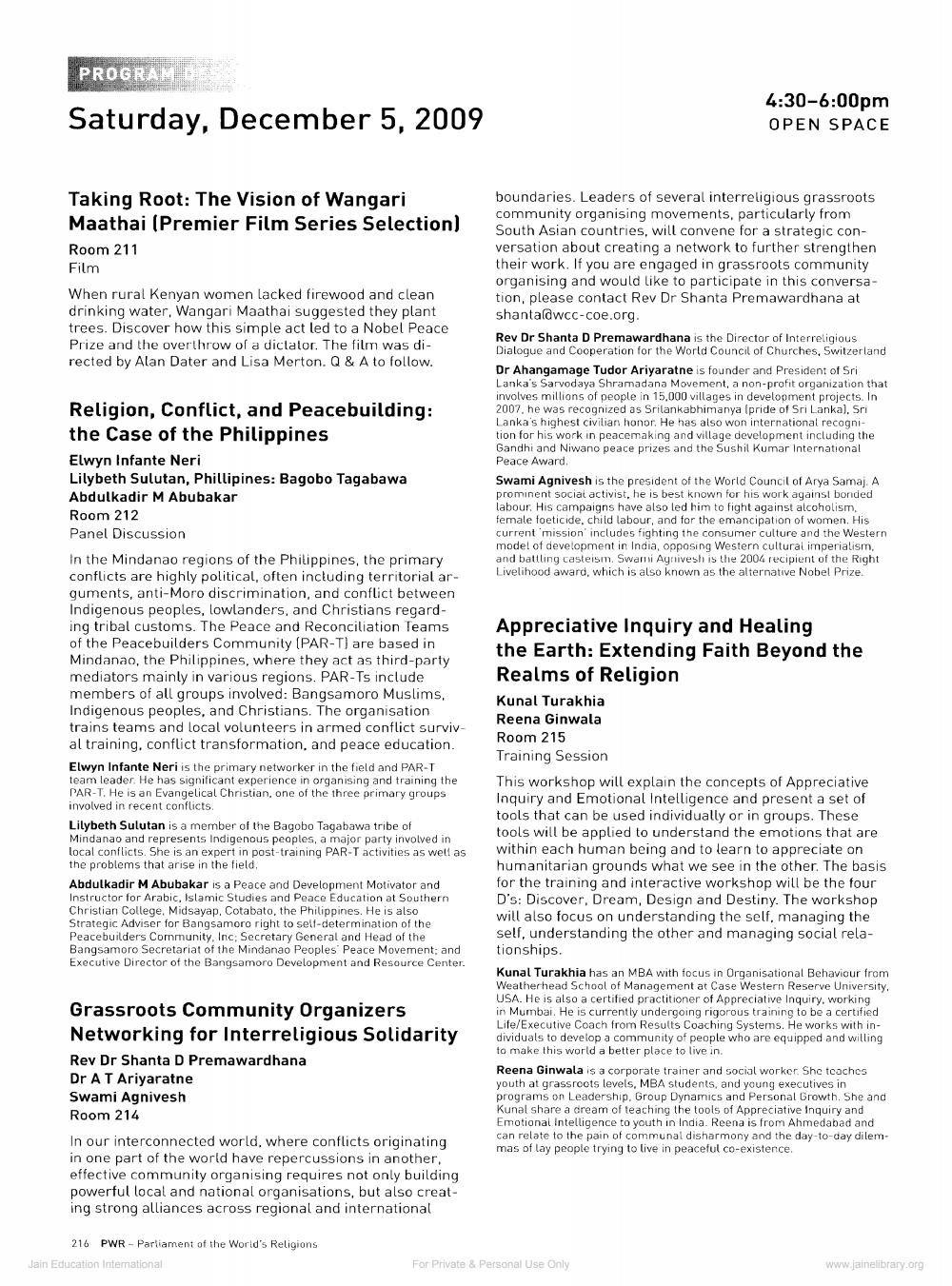________________
PROGRAM
Saturday, December 5, 2009
Taking Root: The Vision of Wangari Maathai (Premier Film Series Selection)
Room 211
Film
When rural Kenyan women lacked firewood and clean drinking water, Wangari Maathai suggested they plant trees. Discover how this simple act led to a Nobel Peace Prize and the overthrow of a dictator. The film was directed by Alan Dater and Lisa Merton. Q & A to follow.
Religion, Conflict, and Peacebuilding: the Case of the Philippines
Elwyn Infante Neri
Lilybeth Sulutan, Phillipines: Bagobo Tagabawa Abdulkadir M Abubakar
Room 212
Panel Discussion
In the Mindanao regions of the Philippines, the primary conflicts are highly political, often including territorial arguments, anti-Moro discrimination, and conflict between Indigenous peoples, lowlanders, and Christians regarding tribal customs. The Peace and Reconciliation Teams of the Peacebuilders Community (PAR-T) are based in Mindanao, the Philippines, where they act as third-party mediators mainly in various regions. PAR-Ts include members of all groups involved: Bangsamoro Muslims, Indigenous peoples, and Christians. The organisation trains teams and local volunteers in armed conflict survival training, conflict transformation, and peace education. Elwyn Infante Neri is the primary networker in the field and PAR-T team leader. He has significant experience in organising and training the PAR-T. He is an Evangelical Christian, one of the three primary groups involved in recent conflicts.
Lilybeth Sulutan is a member of the Bagobo Tagabawa tribe of Mindanao and represents Indigenous peoples, a major party involved in local conflicts. She is an expert in post-training PAR-T activities as wet! as the problems that arise in the field.
Abdulkadir M Abubakar is a Peace and Development Motivator and Instructor for Arabic, Islamic Studies and Peace Education at Southern Christian College, Midsayap, Cotabato, the Philippines. He is also Strategic Adviser for Bangsamoro right to self-determination of the Peacebuilders Community, Inc; Secretary General and Head of the Bangsamoro Secretariat of the Mindanao Peoples Peace Movement; and Executive Director of the Bangsamoro Development and Resource Center.
Grassroots Community Organizers Networking for Interreligious Solidarity
Rev Dr Shanta D Premawardhana
Dr A T Ariyaratne
Swami Agnivesh Room 214
In our interconnected world, where conflicts originating in one part of the world have repercussions in another, effective community organising requires not only building powerful local and national organisations, but also creating strong alliances across regional and international
216 PWR-Parliament of the World's Religions
Jain Education Intemational
boundaries. Leaders of several interreligious grassroots community organising movements, particularly from South Asian countries, will convene for a strategic conversation about creating a network to further strengthen their work. If you are engaged in grassroots community organising and would like to participate in this conversation, please contact Rev Dr Shanta Premawardhana at
[email protected].
4:30-6:00pm OPEN SPACE
Rev Dr Shanta D Premawardhana is the Director of Interreligious Dialogue and Cooperation for the World Council of Churches, Switzerland Dr Ahangamage Tudor Ariyaratne is founder and President of Sri Lanka's Sarvodaya Shramadana Movement, a non-profit organization that involves millions of people in 15,000 villages in development projects. In 2007, he was recognized as Srilankabhimanya (pride of Sri Lanka), Sri Lanka's highest civilian honor. He has also won international recognition for his work in peacemaking and village development including the Gandhi and Niwano peace prizes and the Sushil Kumar International Peace Award.
Swami Agnivesh is the president of the World Council of Arya Samaj. A prominent social activist, he is best known for his work against bonded labour. His campaigns have also led him to fight against alcoholism, female foeticide, child labour, and for the emancipation of women. His current 'mission' includes fighting the consumer culture and the Western model of development in India, opposing Western cultural imperialism, and battling casteism. Swami Agnivesh is the 2004 recipient of the Right Livelihood award, which is also known as the alternative Nobel Prize.
Appreciative Inquiry and Healing the Earth: Extending Faith Beyond the Realms of Religion
Kunal Turakhia
Reena Ginwala Room 215 Training Session
This workshop will explain the concepts of Appreciative Inquiry and Emotional Intelligence and present a set of tools that can be used individually or in groups. These tools will be applied to understand the emotions that are within each human being and to learn to appreciate on humanitarian grounds what we see in the other. The basis for the training and interactive workshop will be the four D's: Discover, Dream, Design and Destiny. The workshop will also focus on understanding the self, managing the self, understanding the other and managing social relationships.
Kunal Turakhia has an MBA with focus in Organisational Behaviour from Weatherhead School of Management at Case Western Reserve University, USA. He is also a certified practitioner of Appreciative Inquiry, working in Mumbai. He is currently undergoing rigorous training to be a certified Life/Executive Coach from Results Coaching Systems. He works with individuals to develop a community of people who are equipped and willing to make this world a better place to live in.
Reena Ginwala is a corporate trainer and social worker. She teaches youth at grassroots levels, MBA students, and young executives in programs on Leadership, Group Dynamics and Personal Growth. She and Kunal share a dream of teaching the tools of Appreciative Inquiry and Emotional Intelligence to youth in India. Reena is from Ahmedabad and can relate to the pain of communal disharmony and the day-to-day dilemmas of lay people trying to live in peaceful co-existence.
For Private & Personal Use Only
www.jainelibrary.org
